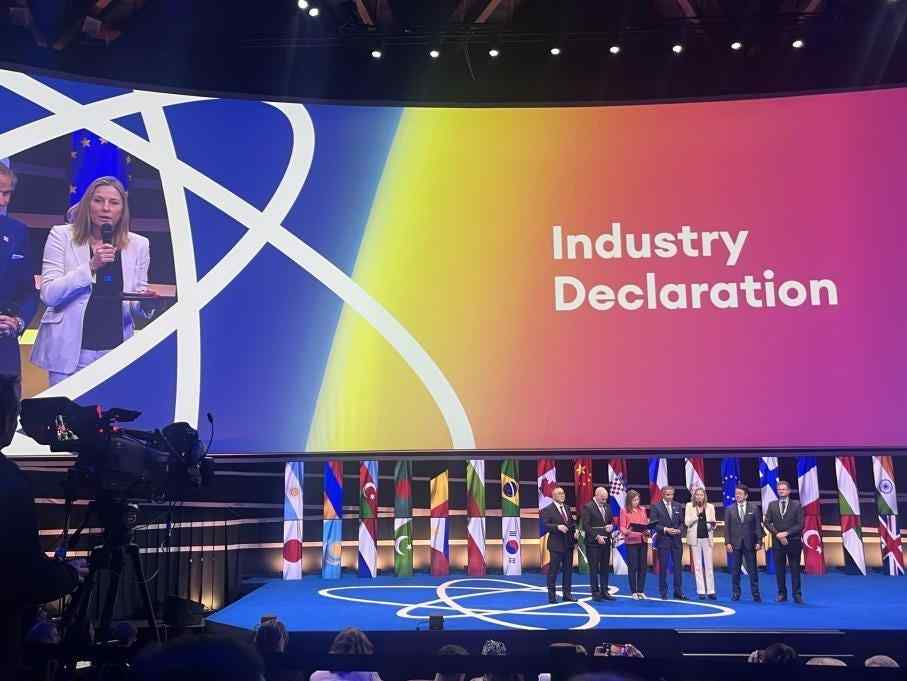Author: THE KERNEL & Gayatri Karnik
Event before the Nuclear Energy Summit by the Belgian Prime Minister’s Office, Brussels, 20th of March 2024.
The event was an informal conversation between IAEA Director General Rafael Mariano Grossi, Belgium Prime Minister Alexander De Croo, and Belgium Energy Minister Tinne Van der Straeten on the eve of the first Nuclear Energy Summit. It was moderated by Isabelle Boemeke (Isodope) and invited young people and civil society organizations from around the world. It was hosted in the Atomium, a large-scale modernist representation of an atom built for the 1958 Brussels World’s Fair.
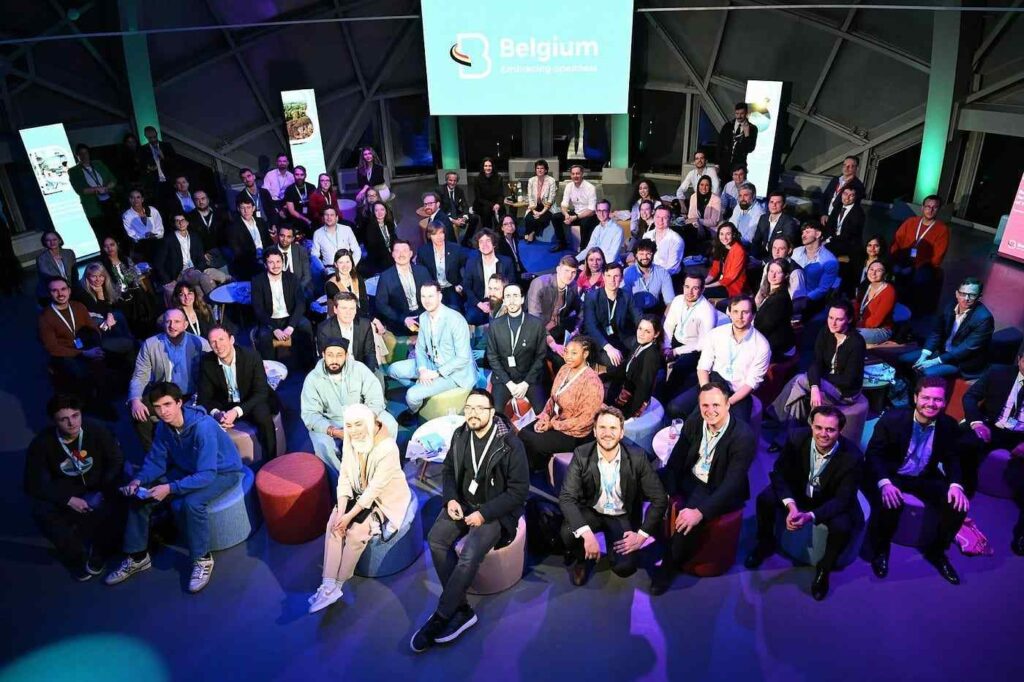
The event highlighted the role of nuclear energy in supporting Belgium’s energy transition towards Net Zero by 2050. Prime Minister De Croo emphasized the role of all renewable and green energies towards a carbon-free energy grid. For nuclear energy specifically, the government needs to improve regulatory standards and predictability to allow the industry to innovate.
The Director General of the IAEA highlighted the close connection between the Atomium and IAEA, built one year apart from each other. 70 years since, the Nuclear Energy Summit is a historic step following the unprecedented acknowledgment and acceleration of nuclear energy agreed at COP28 in the UAE.
The Energy minister highlighted that as with many other forms of energy production, nuclear has its pros and cons. But having active conversations about it with the citizens, particularly about nuclear waste, leads to a stronger society.
Participants asked a wide range of questions like the need for standardization, the role of AI, supporting financing, skilling the next generation, the role of intergenerational discussion-making.
- The IAEA is working with governments, regulators, and industry to develop comprehensive safety standards under the Nuclear Harmonization and Standardization Initiative (NHSI).
- Artificial intelligence will consume of lot of power but also support the optimisation of energy output and advancements in nuclear technology
- The current financing architecture is anti-nuclear, however, IAEA plans to work with international funds and banks to reverse their policies on nuclear energy funding.
- To keep talent and attract more people into the industry, new projects should be available that make young people believe there is a long career in nuclear science
- The young generation needs to have a voice in conversations about nuclear energy and governments need to build forums to hear them. Climate change not only affects their future but nuclear waste will be an intergenerational issue. Collectivized international storage of nuclear waste is an option worth exploring.
The First Nuclear Energy Summit, Brussels, 24th March 2024
The first Nuclear Energy Summit was co-hosted by Belgium and the IAEA. While it was announced in October 2023, the summit was building on the success of nuclear energy at COP28 in December. The summit saw the attendance of high-level representatives from 30 states and the European Union, including 14 heads of state from Armenia, Belgium, Croatia, Czech Republic, Finland, France, Hungary, the Netherlands, Poland, Romania, Serbia, Slovakia, Slovenia and Sweden as well as the president of the European Council and Commission.

Declaration
All states presented a declaration that underscores nuclear technology as a pivotal element in the global strategy to reduce emissions across energy and industrial sectors. Nuclear energy supports energy security by bolstering energy resilience and fostering the clean energy transition. IAEA is playing a pivotal role in facilitating international cooperation which is essential to support states opting to develop a civilian nuclear program.
Strengthening collaboration among nuclear regulators is required to expedite the deployment of advanced reactors and ensure stability in the industry and supply chains, including fuel, equipment manufacturing and resource security. Investing in nuclear education and research is needed to ensure the availability of skilled professionals and retain a motivated workforce.
Competitive financing is required for the extension of existing reactors, construction of new plants, and early deployment of advanced reactors, including SMRs. As is mobilizing both public and private investments and including nuclear energy in ESG policies within the international financial system. International organizations, including multinational development banks and regional bodies, should support financing nuclear energy projects.
Country Statements
States individually made statements that solidified their national commitment to nuclear energy as part of their transition to clean energy by 2050. The European States also stressed the importance of energy independence that nuclear energy allows in the wake of Russia’s invasion of Ukraine. Nuclear energy is a key tool towards bolstering national security and reducing reliance on unpredictable regimes. Many states have managed to successfully transition away from Russian Uranium within their supply chains, however, Hungary still is reliant on Russian fuel.
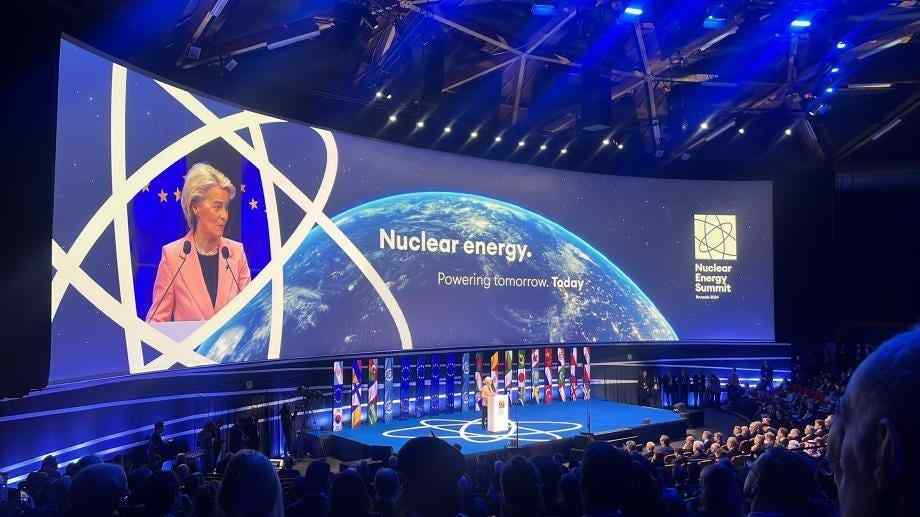
The 14 states of the EU’s French alliance were unanimous in their support of the extension of the lifespans of their aging nuclear plants. However, commitments to invest in new plants for energy generation were limited. This was most apparent in the host state of Belgium, as they will keep investing in nuclear energy however, have not committed plans to build new reactors to replace the ones decommissioned.
The success nuclear energy found in Dubai last year, through the recommendations following the Global stock-take as well as the triple nuclear pledge States made on the margins of COP28, has further propelled it into state strategies to combat climate change. Azerbaijan, the host of COP29, hopes to carry forward the momentum of the previous COP and will include nuclear energy in its resource deliberation. International cooperation, especially sharing technology and knowledge with states wanting to start their own civilian nuclear program was highly encouraged.
However, international financing still remains a major challenge states have identified for the expansion and maintenance of their reactors. Especially for developing countries. Unlocking financing was a major theme of the conference and states hope that international banks view nuclear as a more credible lending option post the summit.
Panels
Four panels, featuring industry leaders and high-ranking government officials, discussed various aspects of the industry.
The first panel on Factors Influencing the Deployment of New, or Prolongation of Existing, Nuclear Capacity featured global, national, and regional perspectives. The EU Commissioner for Energy highlighted that energy legislation should be technology-neutral so states can choose to apply it to nuclear energy as with other forms of green and renewable energy. For new nuclear projects, community engagement is essential, including building up public infrastructure to support increasing loads in cities and towns where the project is being constructed. AI will also be an integral part of the upcoming new projects to support complex systems and the discovery of new materials. The panel highlighted the need for private sources of financing.
Providing national perspectives, energy ministers around Europe emphasized the challenges associated with coal phase out, and replacing it with nuclear power. For renewables, advanced energy storage or compensatory forms of energy like nuclear are needed to balance the unpredictability of weather-generated energy. Safety and transparency are critical for new nuclear projects.
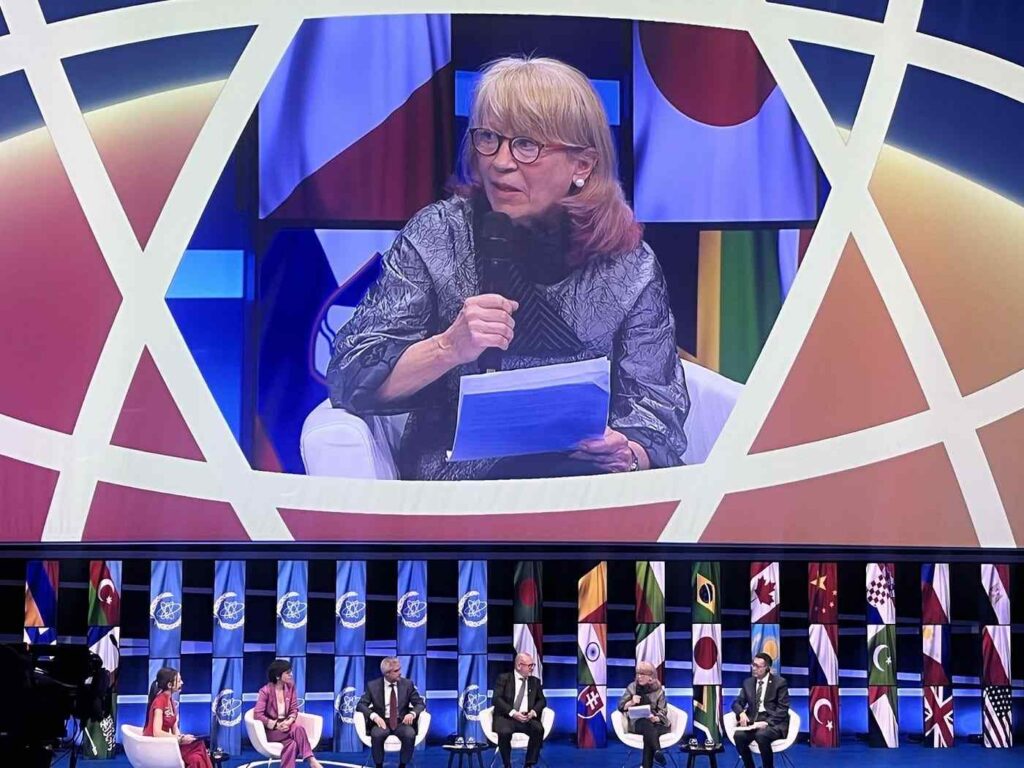
The American Department of Energy highlighted the need to be on top of new nuclear innovation through their ARD (Advanced Reactor Demonstration) Program. New domestic legislation aimed at bolstering business investment to support the American nuclear industry includes Energy Production Tax Credits, Investment Tax Credits and the Inflation Reduction Act.
The second and third panels focused on the Advancements in Nuclear Technology and Innovation Throughout the Nuclear Fuel Cycle. Experts from various industries; including mining, enrichment, fusion, decommissioning, and waste disposal highlighted the advancements in their sectors.
The final panel focused on financing, with speakers from international financial institutions providing their expertise on methods to establish a Level Playing Field for Financing Nuclear Power. The panel emphasized the need for predictability and a stable investment environment for investors. While funding mechanisms for nuclear are improving, the riskiest stages of the build and first-of-a-kind reactor designs are not finding takers, which is further amplified by the unpredictability with the regulators as well as with built costs and time overruns. The constant debate nuclear energy is subjected to in each new policy initiative further adds to its unpredictability. While institutions like the EBRC support nuclear decommissioning and safety projects, they don’t support new builds.
Industry and Civil Society
Civil society organizations from around the world turned up in droves to show their support for nuclear energy at the summit. While there were many representatives at the summit itself, many more stood outside the summit with pro-nuclear banners and slogans to bring attention to the summit attendees the support nuclear has within their constituencies.
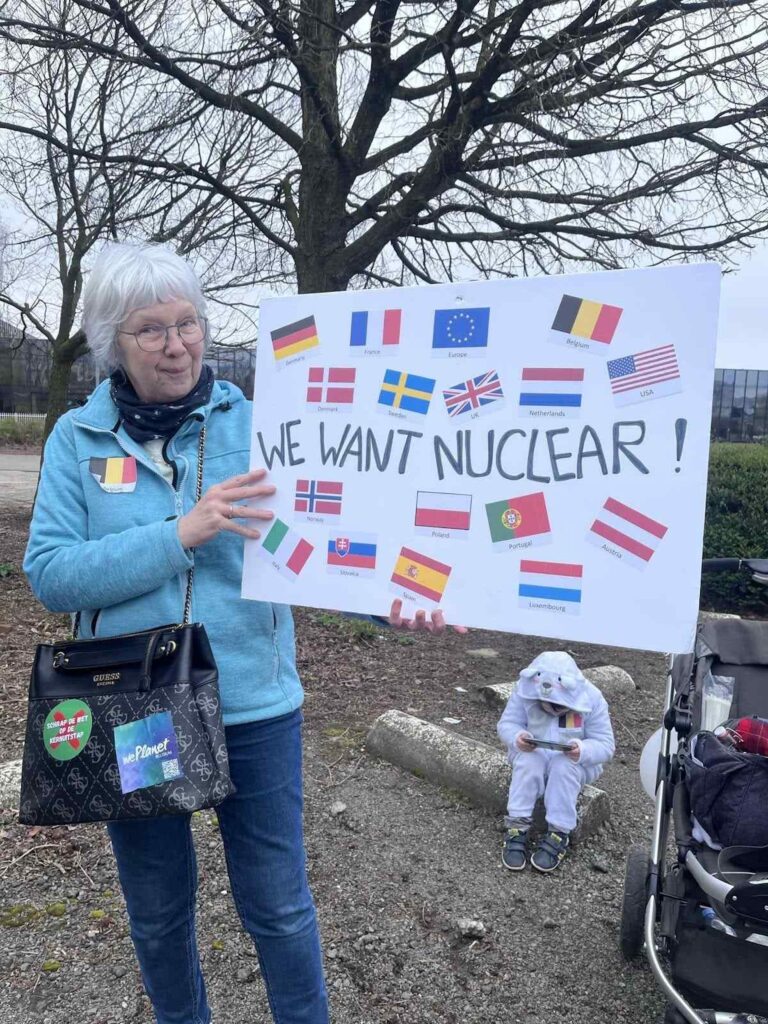
Over 50 civil society organizations, including Generation Atomic, submitted to the IAEA a joint statement for the World leaders to develop a global Messmer plan to deliver the equivalent of 1200 large reactors worth of installed nuclear capacity by 2050. Civil Society organizations firmly believe that nuclear energy is essential in our transition to a low-carbon emissions energy grid.
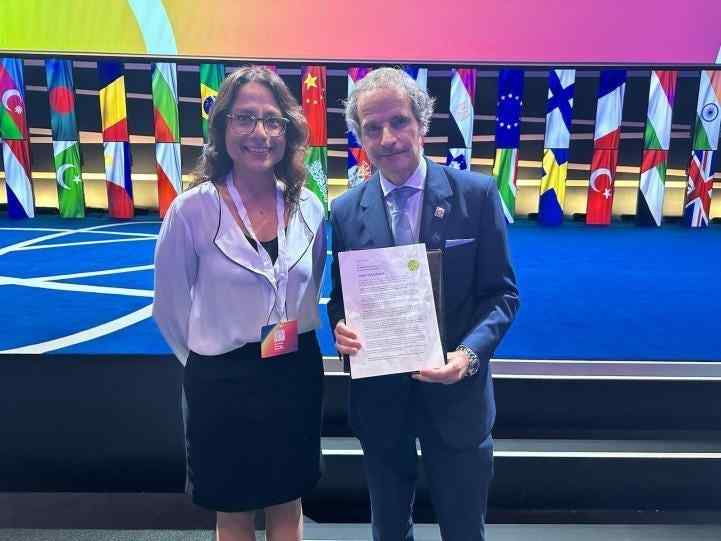
Meanwhile, over 300 representatives from the nuclear industry around the world were present at the summit. At the end of the summit, the representatives of the industry submitted a declaration to the IAEA that supported the triple nuclear industry pledge made in Dubai. They called on governments to implement consistent long-term policies supporting nuclear fleet deployment and also to provide clarity to investors on funding and access to climate finance for nuclear projects. Additionally, the promotion of supply chain development and investment in nuclear research were emphasized for sustainable expansion.
